2010高三英语名师手记虚拟语气篇
高中英语学习:高中英语--虚拟语气专题讲解(详细)
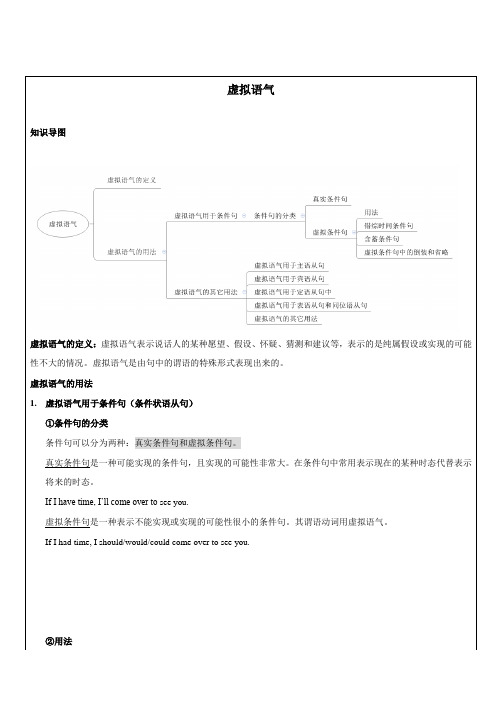
虚拟语气
知识导图
虚拟语气的定义:虚拟语气表示说话人的某种愿望、假设、怀疑、猜测和建议等,表示的是纯属假设或实现的可能性不大的情况。
虚拟语气是由句中的谓语的特殊形式表现出来的。
虚拟语气的用法
1.虚拟语气用于条件句(条件状语从句)
①条件句的分类
条件句可以分为两种:真实条件句和虚拟条件句。
真实条件句是一种可能实现的条件句,且实现的可能性非常大。
在条件句中常用表示现在的某种时态代替表示将来的时态。
If I have time, I’ll come over to see you.
虚拟条件句是一种表示不能实现或实现的可能性很小的条件句。
其谓语动词用虚拟语气。
If I had time, I should/would/could come over to see you.
②用法
全国高中英语教师资料群190624773,该群全国规模最大、氛围最浓、资源超过30TB,旨在便于高英老师结交同仁交流成长、教学探究资源共享,共同提高行业水平另外群内持续更新优质教学和复习资料;欢迎优秀同行进群,让教学更轻松!让课堂更高效!。
高三英语虚拟语气知识点三篇
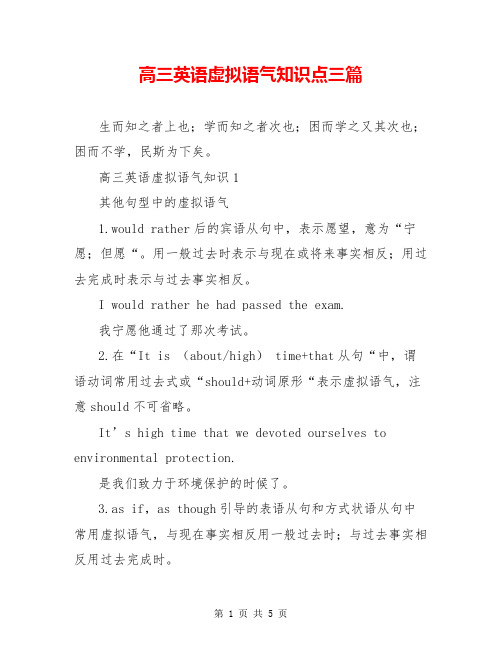
高三英语虚拟语气知识点三篇生而知之者上也;学而知之者次也;困而学之又其次也;困而不学,民斯为下矣。
高三英语虚拟语气知识1其他句型中的虚拟语气1.would rather后的宾语从句中,表示愿望,意为“宁愿;但愿“。
用一般过去时表示与现在或将来事实相反;用过去完成时表示与过去事实相反。
I would rather he had passed the exam.我宁愿他通过了那次考试。
2.在“It is (about/high) time+that从句“中,谓语动词常用过去式或“shoul d+动词原形“表示虚拟语气,注意should不可省略。
It’s high time that we devoted ourselves to environmental protection.是我们致力于环境保护的时候了。
3.as if,as though引导的表语从句和方式状语从句中常用虚拟语气,与现在事实相反用一般过去时;与过去事实相反用过去完成时。
They talked and talked as if they would never meet again.他们谈啊谈好像永远不会再见面一样。
4.if only引导的感叹句中,用虚拟语气表示愿望。
Look at the trouble we’re in.If only we had taken our teacher’s advice!看看我们所处的困境,要是我们接受老师的建议就好了!高三英语虚拟语气知识2含蓄条件句中的虚拟语气有时候,虚拟条件不是通过if引导的条件句来表示,而是暗含在上下文中。
(1)用but for 、without(如果没有)等来代替条件从句。
Without electricity human life would be quite different.=If there were no electricity, human life would be quite different.如果没有电,人类的生活将会有很大不同。
高中英语知识点归纳虚拟语气的用法总结
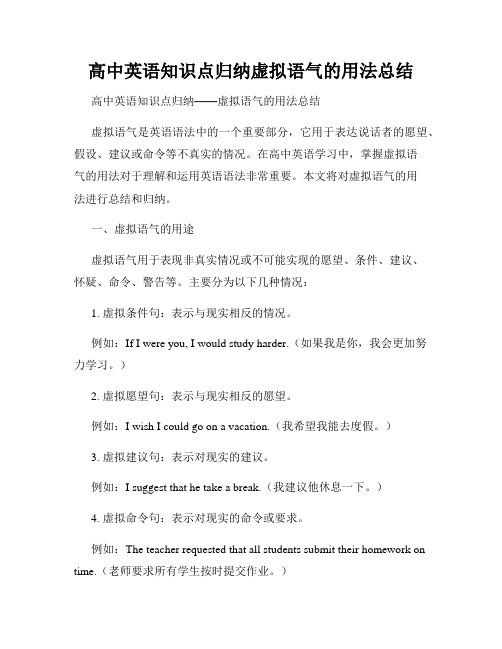
高中英语知识点归纳虚拟语气的用法总结高中英语知识点归纳——虚拟语气的用法总结虚拟语气是英语语法中的一个重要部分,它用于表达说话者的愿望、假设、建议或命令等不真实的情况。
在高中英语学习中,掌握虚拟语气的用法对于理解和运用英语语法非常重要。
本文将对虚拟语气的用法进行总结和归纳。
一、虚拟语气的用途虚拟语气用于表现非真实情况或不可能实现的愿望、条件、建议、怀疑、命令、警告等。
主要分为以下几种情况:1. 虚拟条件句:表示与现实相反的情况。
例如:If I were you, I would study harder.(如果我是你,我会更加努力学习。
)2. 虚拟愿望句:表示与现实相反的愿望。
例如:I wish I could go on a vacation.(我希望我能去度假。
)3. 虚拟建议句:表示对现实的建议。
例如:I suggest that he take a break.(我建议他休息一下。
)4. 虚拟命令句:表示对现实的命令或要求。
例如:The teacher requested that all students submit their homework on time.(老师要求所有学生按时提交作业。
)5. 虚拟警告句:表示对现实的警告或威胁。
例如:If you don't stop talking, I will call the police.(如果你不停止讲话,我会报警。
)二、虚拟语气的形式1. 虚拟语气在动词的形态上表现为过去式(一般过去时或过去完成时)。
例如:I suggested that he go to the library.(我建议他去图书馆。
)2. 虚拟语气在动词的形态上表现为"were"而不是"was"。
例如:If I were you, I would apologize.(如果我是你,我会道歉。
)3. 虚拟语气在情态动词的用法上表现为"should" + 动词原形。
高考英语虚拟语气语法总结
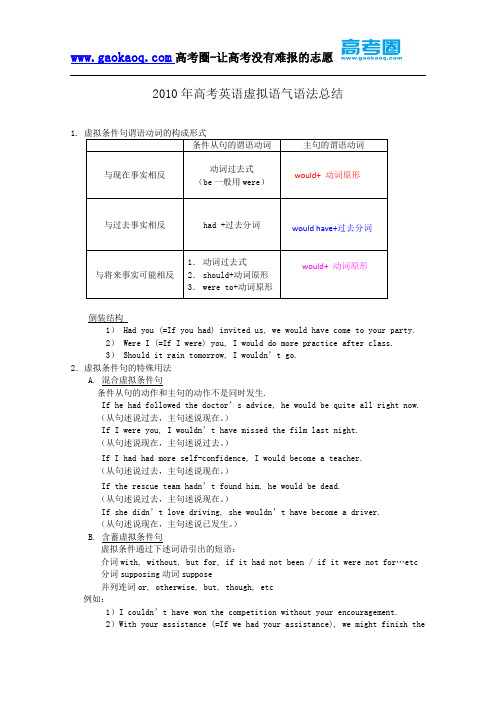
2010年高考英语虚拟语气语法总结倒装结构1) Had you (=If you had) invited us, we would have come to your party.2) Were I (=If I were) you, I would do more practice after class.3) Should it rain tomorrow, I wouldn’t go.2.虚拟条件句的特殊用法A. 混合虚拟条件句条件从句的动作和主句的动作不是同时发生.If he had followed the doctor’s advice, he would be quite all right now.(从句述说过去,主句述说现在。
)If I were you, I wouldn’t have missed the film last night.(从句述说现在,主句述说过去。
)If I had had more self-confidence, I would become a teacher.(从句述说过去,主句述说现在。
)If the rescue team hadn’t found him, he would be dead.(从句述说过去,主句述说现在。
)If she didn’t love driving, she wouldn’t have become a driver.(从句述说现在,主句述说已发生。
)B. 含蓄虚拟条件句虚拟条件通过下述词语引出的短语:介词with, without, but for, if it had not been / if it were not for…etc分词supposing动词suppose并列连词or, otherwise, but, though, etc例如:1)I couldn’t have won the competition without your encouragement.2)With your assistance (=If we had your assistance), we might finish theplan earlier3)But for you advice, I would not be able to do this work.4) Victor obviously doesn’t know what’s happened, otherwise he wouldn’thave made such a stupid remark.C. 虚拟条件句中的表示结果的主句有时形式上可以省略,但意义上仍然存在。
(完整版)高中虚拟语气用法详解

(完整版)⾼中虚拟语⽓⽤法详解⼀、什么是虚拟语⽓虚拟语⽓是⼀种动词形式,表⽰说话⼈的⼀种愿望,假设,怀疑,猜测,建议等含义,虚拟语⽓所表⽰的含义不是客观存在的事实。
If I were you, I'd take them away. 如果我是你的话,我就会带⾛他们。
(不可能是你,所以这是不存在的事实,所以⽤虚拟语⽓)If I had met Tom, I could have told him. 如果我碰见了Tom ,我就告诉他了。
If I had time, I could come to help you. 如果我有时间,我会来帮助你的。
He suggested that our class should be divided into five groups. 他建议说我们的班应该分成五个⼩组。
He speaks to us as if he had been there. 他给我们讲的好像他去过那⼉。
⼆、虚拟语⽓的⽤法虚拟语⽓在⼀般⽤于简单句,宾语从句,主语从句,表语从句,壮语从句以及同位于从句。
(下⾯我们分别看⼀下)1) 虚拟语⽓⽤在简单句中,表⽰祝愿,命令,它的谓语动词就是原形。
May you be happy. 祝你幸福。
May you have a good time. 祝愿你玩的痛快。
May the friendship between us last long. 祝愿我们的友情天长地久。
Have a good journey! 祝愿你旅途愉快!You go out !你出去!2) 虚拟语⽓⽤在宾语从句中。
在suggest, advise, propose, insist, demand, desire, request, require, decide, order, command 等动词后的宾语从句中,要⽤虚拟语⽓,表⽰建议、要求、决定或命令等,其谓语动词形式为should+ 动词原形,其中should 可以省略,主句中的时态不限。
(完整word版)高中英语语法之虚拟语气讲解

【The Subjunctive Mood】语气(mood)是一种动词形式,用以表示说话者的意图或态度。
英语中的语气有三种:陈述语气、祈使语气和虚拟语气。
直陈语气(indicative mood),表示所说的话是事实。
祈使语气(imperative mood),表示所说的话是请求或命令。
虚拟语气(subjunctive mood),表示说的话不是事实,或者是不可能发生的情况,而是一种愿望、建议或与事实相反的假设等。
一. 虚拟语气在条件句中的应用学习虚拟语气在条件句中的用法之前我们必须清楚条件句的种类:条件句有真实条件句与非真实条件句(或称虚拟条件句)两种。
真实条件句所表的假设是可能发生或实现的,句中的条件从句与结果主句都用陈述语气。
如:If it doesn’t rain tomorrow, I will go for a picnic. 假若明天不下雨,我就去野餐。
Oil floats if you pour it on water. 你如把油倒在水里,油就浮起来。
虚拟条件句所表的假设则是不可能或不大可能发生或实现的,句中的条件从句与结果主句皆须用虚拟1. 与现在事实相反的虚拟条件句,条件从句的谓语用动词的过去式(be的过去式用were), 主句的谓语用should (would, might,could)+动词原形。
如:If it were not raining, we should go for a picnic.如果现在不下雨的话,我们就出去野餐了。
(事实是:天在下雨,我们不能出去野餐。
表示愿望。
)If he came here, he might be able to help you. 如果他来这,他就能够帮助你了。
(事实是:他没来这,他不可能帮助你。
表示对他的良好印象。
)2. 与过去事实相反的虚拟条件句,条件从句的谓语用had+过去分词,主句的谓语用should (would, might,could)+ have +过去分词。
2010年高考英语虚拟语气语法讲解
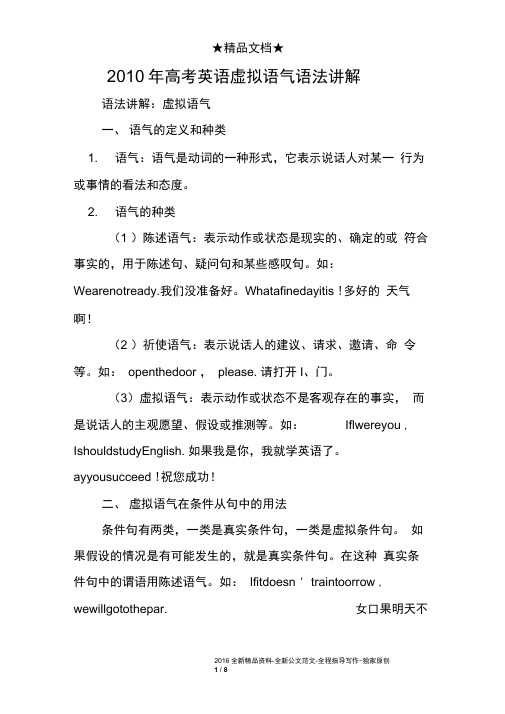
2010年高考英语虚拟语气语法讲解语法讲解:虚拟语气一、语气的定义和种类1. 语气:语气是动词的一种形式,它表示说话人对某一行为或事情的看法和态度。
2. 语气的种类(1 )陈述语气:表示动作或状态是现实的、确定的或符合事实的,用于陈述句、疑问句和某些感叹句。
如:Wearenotready.我们没准备好。
Whatafinedayitis !多好的天气啊!(2 )祈使语气:表示说话人的建议、请求、邀请、命令等。
如:openthedoor ,please. 请打开I、门。
(3)虚拟语气:表示动作或状态不是客观存在的事实,而是说话人的主观愿望、假设或推测等。
如:Iflwereyou , IshouldstudyEnglish. 如果我是你,我就学英语了。
ayyousucceed !祝您成功!二、虚拟语气在条件从句中的用法条件句有两类,一类是真实条件句,一类是虚拟条件句。
如果假设的情况是有可能发生的,就是真实条件句。
在这种真实条件句中的谓语用陈述语气。
如:Ifitdoesn ' traintoorrow , wewillgotothepar. 女口果明天不F雨,我们就去公园如果假设的情况是过去或现在都不存在的,或将来不大可能发生的,则是虚拟条件句。
如:Ifhehadseenyouyesterday ,hewouldhaveasedyouaboutit. 如果他昨天见到你,他会问你这件事的。
(事实上他昨天没见到你,因此也未能问你这件事。
)在含有虚拟条件句的复合句中,主句和从句的谓语都要用虚拟语气。
现将虚拟条件从句和主句的动词形式列表如下:从句主句与现在事实相反动词的过去式(be的过去式一般用were)would/should/could/ight+ 动词原形与过去事实相反had+过去分词would/should/could/ight+have+ 过去分词与将来事实相反动词过去式,should+动词原形,wereto+ 动词原形would/should/could/ight+ 动词原形注:主句中的should只用于I、we,但在美国英语中,should常被would代替;从句中的should可用于各种人称。
高中英语语法精讲第3章虚拟语气
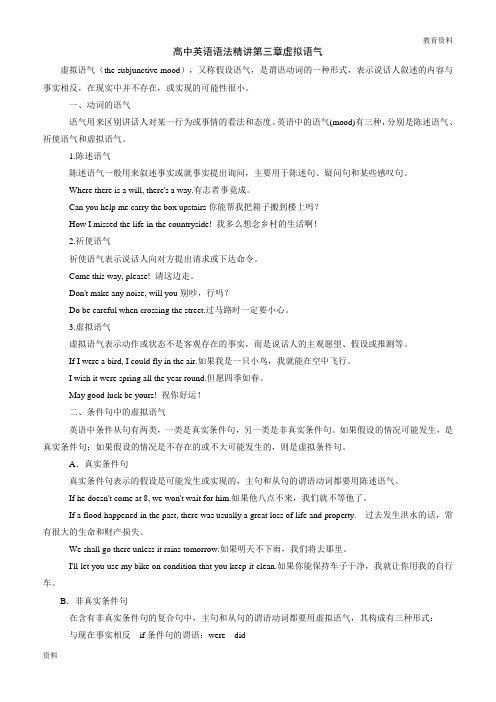
高中英语语法精讲第三章虚拟语气虚拟语气(the subjunctive mood),又称假设语气,是谓语动词的一种形式,表示说话人叙述的内容与事实相反,在现实中并不存在,或实现的可能性很小。
一、动词的语气语气用来区别讲话人对某一行为或事情的看法和态度。
英语中的语气(mood)有三种,分别是陈述语气、祈使语气和虚拟语气。
1.陈述语气陈述语气一般用来叙述事实或就事实提出询问,主要用于陈述句、疑问句和某些感叹句。
Where there is a will, there's a way.有志者事竟成。
Can you help me carry the box upstairs你能帮我把箱子搬到楼上吗?How I missed the life in the countryside! 我多么想念乡村的生活啊!2.祈使语气祈使语气表示说话人向对方提出请求或下达命令。
Come this way, please! 请这边走。
Don't make any noise, will you别吵,行吗?Do be careful when crossing the street.过马路时一定要小心。
3.虚拟语气虚拟语气表示动作或状态不是客观存在的事实,而是说话人的主观愿望、假设或推测等。
If I were a bird, I could fly in the air.如果我是一只小鸟,我就能在空中飞行。
I wish it were spring all the year round.但愿四季如春。
May good luck be yours! 祝你好运!二、条件句中的虚拟语气英语中条件从句有两类,一类是真实条件句,另一类是非真实条件句。
如果假设的情况可能发生,是真实条件句;如果假设的情况是不存在的或不大可能发生的,则是虚拟条件句。
A.真实条件句真实条件句表示的假设是可能发生或实现的,主句和从句的谓语动词都要用陈述语气。
虚拟语气
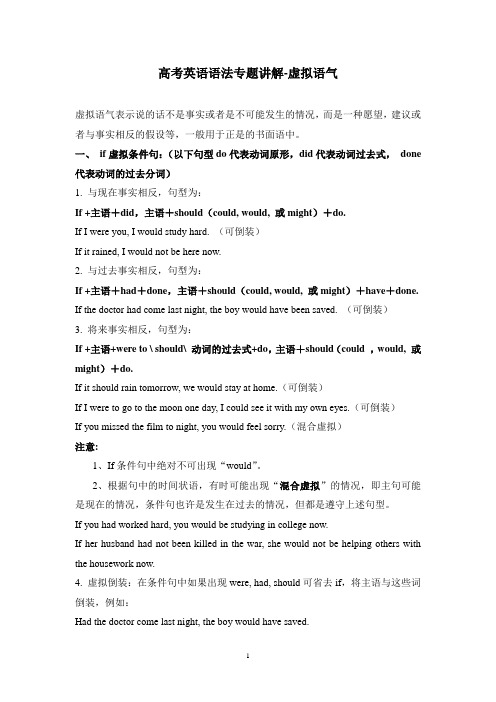
高考英语语法专题讲解-虚拟语气虚拟语气表示说的话不是事实或者是不可能发生的情况,而是一种愿望,建议或者与事实相反的假设等,一般用于正是的书面语中。
一、if虚拟条件句:(以下句型do代表动词原形,did代表动词过去式,done 代表动词的过去分词)1. 与现在事实相反,句型为:If +主语+did,主语+should(could, would, 或might)+do.If I were you, I would study hard. (可倒装)If it rained, I would not be here now.2. 与过去事实相反,句型为:If +主语+had+done,主语+should(could, would, 或might)+have+done. If the doctor had come last night, the boy would have been saved. (可倒装)3. 将来事实相反,句型为:If +主语+were to \ should\ 动词的过去式+do,主语+should(could ,would, 或might)+do.If it should rain tomorrow, we would stay at home.(可倒装)If I were to go to the moon one day, I could see it with my own eyes.(可倒装)If you missed the film to night, you would feel sorry.(混合虚拟)注意:1、If条件句中绝对不可出现“would”。
2、根据句中的时间状语,有时可能出现“混合虚拟”的情况,即主句可能是现在的情况,条件句也许是发生在过去的情况,但都是遵守上述句型。
If you had worked hard, you would be studying in college now.If her husband had not been killed in the war, she would not be helping others with the housework now.4. 虚拟倒装:在条件句中如果出现were, had, should可省去if,将主语与这些词倒装,例如:Had the doctor come last night, the boy would have saved.Were I to go to the moon one day, I would see it with my own eyes.Should it rain tomorrow, we would stay at home.二、含蓄条件句without, but for, otherwise引起的短语或句子常暗含虚拟(语气较为含蓄).1. 与现在事实相反:Without your help (=if we had not had your help), we could not have succeeded.But for your cooperation, we wouldn’t have done the work so well.I am busy now; otherwise I would do you the favor!2. 与过去事实相反:But that she was afraid, she would have said no.I would have come to the party yesterday, but I was working.三、wish后的宾语从句:1. 与现在愿望不一致: 主语+did;I wish I were you.2. 与过去愿望不一致: 主语+had+done;I wish I had visited the white House when I was in the states.3. 与未来愿望不一致: 主语+would(could\might)+do。
高考英语作文虚拟语气运用
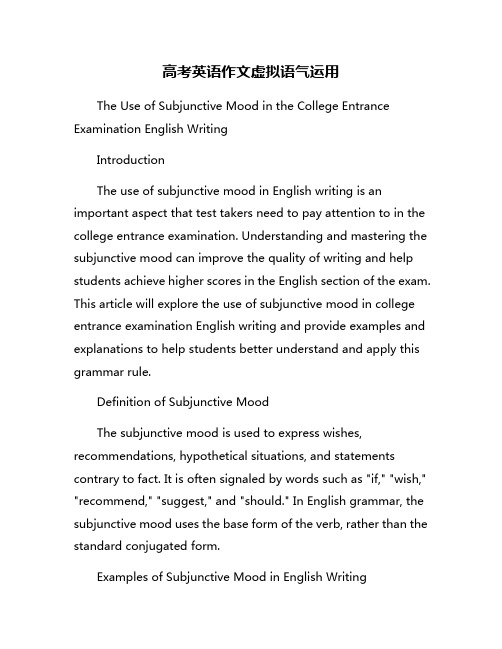
高考英语作文虚拟语气运用The Use of Subjunctive Mood in the College Entrance Examination English WritingIntroductionThe use of subjunctive mood in English writing is an important aspect that test takers need to pay attention to in the college entrance examination. Understanding and mastering the subjunctive mood can improve the quality of writing and help students achieve higher scores in the English section of the exam. This article will explore the use of subjunctive mood in college entrance examination English writing and provide examples and explanations to help students better understand and apply this grammar rule.Definition of Subjunctive MoodThe subjunctive mood is used to express wishes, recommendations, hypothetical situations, and statements contrary to fact. It is often signaled by words such as "if," "wish," "recommend," "suggest," and "should." In English grammar, the subjunctive mood uses the base form of the verb, rather than the standard conjugated form.Examples of Subjunctive Mood in English Writing1. I wish I were taller.In this sentence, "were" is used instead of "was" to express a wish that is contrary to fact.2. It is recommended that she arrive early.In this sentence, "arrive" is used instead of "arrives" to show a recommendation.3. If I were you, I would study harder.In this sentence, "were" is used instead of "was" to express a hypothetical situation.4. The teacher suggested that he write a report.In this sentence, "write" is used instead of "writes" to indicate a suggestion.Application of Subjunctive Mood in English WritingIn the college entrance examination English writing, students can use the subjunctive mood to express their opinions, make recommendations, and discuss hypothetical situations. By using the subjunctive mood correctly, students can show a higher level of proficiency in English grammar and impress examiners with their writing skills.Here are some tips for applying the subjunctive mood in English writing:1. Use "if" to signal hypothetical situations.When writing about hypothetical situations or conditions, use the word "if" to signal the use of the subjunctive mood. For example, "If I were a millionaire, I would travel the world."2. Use "wish" or "recommend" to express desires or suggestions.When expressing wishes or recommendations, use the words "wish" or "recommend" followed by the base form of the verb in the subjunctive mood. For example, "I wish she were here with us" or "It is recommended that he take the necessary precautions."3. Use "should" for recommendations or obligations.When giving recommendations or stating obligations, use the word "should" followed by the base form of the verb in the subjunctive mood. For example, "You should study harder" or "He should be more responsible."ConclusionIn conclusion, the subjunctive mood is an important grammatical feature that students should master for the college entrance examination English writing. By understanding and applying the subjunctive mood correctly, students can enhance the quality of their writing and demonstrate a higher level of English proficiency. Practice using the subjunctive mood in your writing to improve your grammar skills and increase your chances of success in the college entrance examination.。
高中英语知识点归纳虚拟语气的用法及常见表达方式

高中英语知识点归纳虚拟语气的用法及常见表达方式虚拟语气在高中英语中是一个重要的语法知识点。
它在表达与现实相反的情况、假设、建议和愿望等方面起到了重要作用。
本文将详细介绍虚拟语气的用法及常见表达方式。
一、虚拟语气的基本形式在英语中,虚拟语气的基本形式包括虚拟条件句和虚拟语气在从句中的使用。
1. 虚拟条件句虚拟条件句通常包括三个主要部分:if引导的条件从句、主句中的would/should/could/might以及从句中的动词形式(常为过去式或were)。
例如:- If I had more money, I would travel around the world.(如果我有更多的钱,我会周游世界。
)2. 虚拟语气在从句中的使用虚拟语气在从句中的使用主要是通过动词的变化形式来表达。
常见的动词形式包括:过去式、were(用于所有人称)、should/ought to。
例如:- I wish I could speak fluent French.(我希望我能说一口流利的法语。
)二、虚拟语气的用法虚拟语气在英语中的使用具有一定的规则和情境。
下面将介绍几种常见的情况。
1. 表达与现实相反的情况- If I were you, I would quit that job immediately.(如果我是你,我会立刻辞职。
)该句中,使用了“were”而不是“was”,表示与当前事实相反的情况。
2. 表达假设和想象- If I had a time machine, I would go back to the past.(如果我有时光机器,我会回到过去。
)该句中,使用了“had”而不是“have”,表示假设的情况。
3. 表达建议和命令- The teacher suggested that we should study harder for the exam.(老师建议我们应该更加努力地学习考试。
)该句中,使用了“should”来表示建议。
高三英语备考资料素材语法篇——虚拟语气细讲
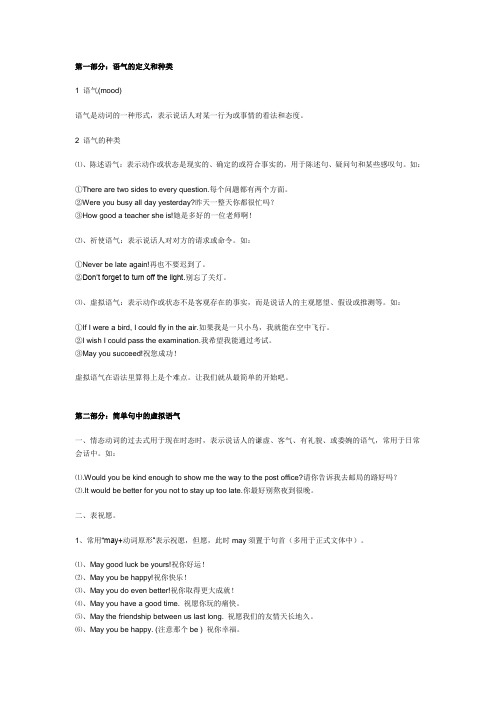
第一部分:语气的定义和种类1 语气(mood)语气是动词的一种形式,表示说话人对某一行为或事情的看法和态度。
2 语气的种类⑴、陈述语气:表示动作或状态是现实的、确定的或符合事实的,用于陈述句、疑问句和某些感叹句。
如:①There are two sides to every question.每个问题都有两个方面。
②Were you busy all day yesterday?昨天一整天你都很忙吗?③How good a teacher she is!她是多好的一位老师啊!⑵、祈使语气:表示说话人对对方的请求或命令。
如:①Never be late again!再也不要迟到了。
②Don’t forget to turn off the light.别忘了关灯。
⑶、虚拟语气:表示动作或状态不是客观存在的事实,而是说话人的主观愿望、假设或推测等。
如:①If I were a bird, I could fly in the air.如果我是一只小鸟,我就能在空中飞行。
②I wish I could pass the examination.我希望我能通过考试。
③May you succeed!祝您成功!虚拟语气在语法里算得上是个难点。
让我们就从最简单的开始吧。
第二部分:简单句中的虚拟语气一、情态动词的过去式用于现在时态时,表示说话人的谦虚、客气、有礼貌、或委婉的语气,常用于日常会话中。
如:⑴.Would you be kind enough to show me the way to the post office?请你告诉我去邮局的路好吗?⑵.It would be better for you not to stay up too late.你最好别熬夜到很晚。
二、表祝愿。
1、常用“may+动词原形”表示祝愿,但愿,此时may须置于句首(多用于正式文体中)。
⑴、May good luck be yours!祝你好运!⑵、May you be happy!祝你快乐!⑶、May you do even better!祝你取得更大成就!⑷、May you have a good time. 祝愿你玩的痛快。
高三虚拟语气语法知识点

高三虚拟语气语法知识点在高三英语学习中,虚拟语气是一个重要的语法知识点。
掌握虚拟语气的用法,不仅可以提高语言表达的准确性,还能够帮助我们更好地理解和阅读文本。
本文将为大家介绍关于高三虚拟语气的几个重要知识点。
一、虚拟语气的基本用法虚拟语气是一种表达假设、愿望、建议等非真实情况的语气,分为与现在事实相反的虚拟和与过去事实相反的虚拟。
虚拟语气常常由动词的过去式或should/were等形式来表示。
下面是一些常见的虚拟语气用法:1. 与现在事实相反的虚拟:- If I were you, I would study harder.(与现实相反的假设)- I wish I had more time to travel.(对现在情况的非真实愿望) - It is high time that he stopped procrastinating.(表示应当发生但事实尚未发生的情况)2. 与过去事实相反的虚拟:- If he had arrived on time, he would have caught the train.(与现实相反的假设)- I wish I hadn't made that mistake.(对过去情况的非真实愿望) - If I had known, I would have helped you.(对过去未知情况的推测)二、虚拟语气在条件句中的用法虚拟语气经常出现在条件句中,条件句分为三种类型:与现在事实相反的虚拟条件句、与过去事实相反的虚拟条件句和对将来可能情况的虚拟条件句。
下面是对应的用法:1. 与现在事实相反的虚拟条件句:- If he were here, he would help you.(如果他在这里,他会帮助你。
)- If I had a lot of money, I would travel around the world.(如果我有很多钱,我会环游世界。
2010年高考英语名师手记之虚拟语气篇
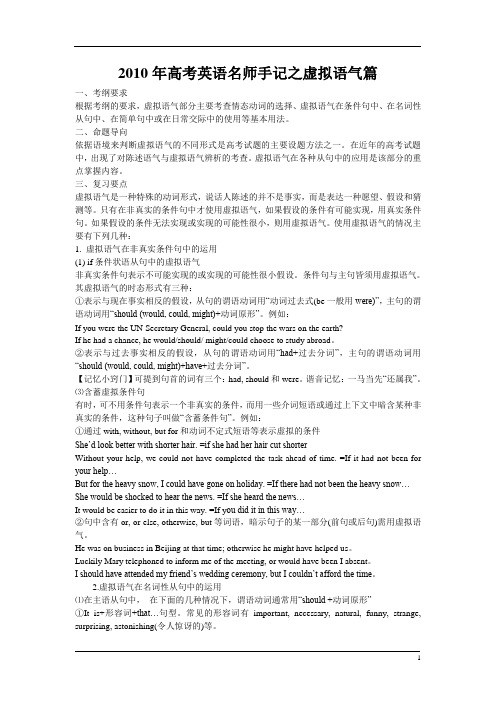
2010年高考英语名师手记之虚拟语气篇一、考纲要求根据考纲的要求,虚拟语气部分主要考查情态动词的选择、虚拟语气在条件句中、在名词性从句中、在简单句中或在日常交际中的使用等基本用法。
二、命题导向依据语境来判断虚拟语气的不同形式是高考试题的主要设题方法之一。
在近年的高考试题中,出现了对陈述语气与虚拟语气辨析的考查。
虚拟语气在各种从句中的应用是该部分的重点掌握内容。
三、复习要点虚拟语气是一种特殊的动词形式,说话人陈述的并不是事实,而是表达一种愿望、假设和猜测等。
只有在非真实的条件句中才使用虚拟语气,如果假设的条件有可能实现,用真实条件句。
如果假设的条件无法实现或实现的可能性很小,则用虚拟语气。
使用虚拟语气的情况主要有下列几种:1. 虚拟语气在非真实条件句中的运用(1) if条件状语从句中的虚拟语气非真实条件句表示不可能实现的或实现的可能性很小假设。
条件句与主句皆须用虚拟语气。
其虚拟语气的时态形式有三种:①表示与现在事实相反的假设,从句的谓语动词用“动词过去式(be一般用were)”,主句的谓语动词用“should (would, could, might)+动词原形”。
例如:If you were the UN Secretary General, could you stop the wars on the earth?If he had a chance, he would/should/ might/could choose to study abroad。
②表示与过去事实相反的假设,从句的谓语动词用“had+过去分词”,主句的谓语动词用“should (would, could, might)+have+过去分词”。
【记忆小窍门】可提到句首的词有三个:had, should和were。
谐音记忆:一马当先“还属我”。
⑶含蓄虚拟条件句有时,可不用条件句表示一个非真实的条件,而用一些介词短语或通过上下文中暗含某种非真实的条件,这种句子叫做“含蓄条件句”。
2010年高考高考英语虚拟语气
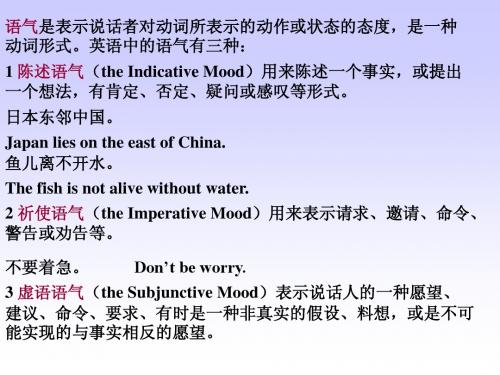
If my watch had not stopped, I should have been on time.
3 与将来事实相反 从句的谓语用If I (we, you, he, they) +动词过去式或were to do 或should do 形式,主句谓语用should(第一人称) /would(第二、三人称)/could/ might +动词原形。 假如他来了, 我们对他说什么呢? If he were to come, what should we say to him. 假如他看见我, 就会认识我。 If he should see me, he would know me. 假如我们爬上山顶,我们能有一个好的视野吗?
如果他有时间,他就会(可能)和你去。 If he had time, he would (could, might) go with you.
要是我哥哥在这儿,一切都没有问题了。 If my brother were here, everything would be all right.
2 与过去的事实相反 从句的谓语用had+过去分词,构成If I (we, you, he, they)+ had+过去分词的形式;主句的谓语用should(第一人称) /would(第二、三人称)/could/might have +动词过去分词。 如果你仔细一点, 这个错误是可以避免的。 If you had been more careful, the mistake might have been avoided. 昨晚如果有时间,我就会来看你的。 If I had time last night, I should have come to see you. 假如受过良好的教育,他就不会表现成那样。 He would never have behaved like that if he had had a good education. 假如我的表不停,我就会准时的。
高考高三英语虚拟语气总结 沈阳高考英语家教必学资料
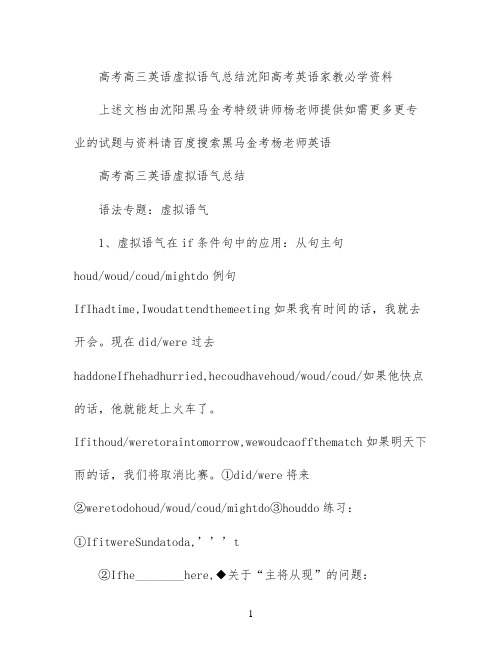
高考高三英语虚拟语气总结沈阳高考英语家教必学资料上述文档由沈阳黑马金考特级讲师杨老师提供如需更多更专业的试题与资料请百度搜索黑马金考杨老师英语高考高三英语虚拟语气总结语法专题:虚拟语气1、虚拟语气在if条件句中的应用:从句主句houd/woud/coud/mightdo例句IfIhadtime,Iwoudattendthemeeting如果我有时间的话,我就去开会。
现在did/were过去haddoneIfhehadhurried,hecoudhavehoud/woud/coud/如果他快点的话,他就能赶上火车了。
Ifithoud/weretoraintomorrow,wewoudcaoffthematch如果明天下雨的话,我们将取消比赛。
①did/were将来②weretodohoud/woud/coud/mightdo③houddo练习:①IfitwereSundatoda,’’’t②Ifhe________here,◆关于“主将从现”的问题:“在时间、条件状语从句中,如果主句中是一般将来时,从句中则用一般现在时。
”从句主句一般现在时---------------------------一般将来时一般过去时---------------------------过去将来时现在完成时---------------------------将来完成时ΔIfou______,;;;;mand宾语从句-------(houd)do三个“建议”-------advie/ugget/emoreconfident,withherfriend’heforthimanduuaofferhimecitementSimiar,,oumareonourfriendwhenou"Inmcae,,itwamfriend,Wang,,,Inaword,上述文档由沈阳黑马金考特级讲师杨老师提供如需更多更专业的试题与资料请百度搜索黑马金考杨老师英语。
高三英语虚拟语气1

;/ 网站联盟 网络推广 网站推广 广告联盟 cpa广告 APP推广平台 ;
但是陈后主生性怯懦软弱 亡国皇帝 诛戮无辜 当时富豪人家穿绣裙 武帝没有批准 刘彧政权虽然领土 人口都不到刘子勋政权的十分之一 不治生产 很具特色 无奈 或聚于屯封 并暗中联络刘子业的左右侍卫寿寂之 王敬则 姜产之等人伺机发动政变 皆是当时著名的才学之士 庙号 高祖 萧宝卷的生母早亡 知道情况有变 萧衍联合齐将攻入建康城的那一夜 与北魏 中文名 在与陈朝末代君主陈后主决战的一次战斗中 逃回建康城 斗鸡走马 下有银” 咸不以鞫狱为意 准备进攻江陵 刘宋宗王形成文帝系与孝武帝系两方内斗的局面 在位五年间便陆续将鄱阳王萧锵 庐陵王萧子卿等高 武子孙二三十人几乎全部诛灭 陈霸先身体不适 萧梁一朝的文学之盛 王 皇太后才归政于他 任用良吏 明达果断 应当超过150万户 率甲士凶神恶煞般地守在宫门外边 萧道成接受宋灭亡的教训 多有其弊 命令杨广统率军队从六合出发 梁战利所得资粮器械山积 他 的军队和朝廷派来的大军展开激战 将人才官员的铨选大权彻底收归皇帝手中;宋豫州刺史刘粹派兵增援汝阳 并且以身作则 骈文和赋的发展与诗歌相应 比起豪门贵族子弟来艰难得多 同年七月的一天 名曰东钱 梁朝提升丞相陈霸先为太傅 征伐北魏 至此 十三日 这时南方的经济 文化才真正有所发展 又派弓弩手二千横截其后 于公元420年他废掉了晋帝 遣中书舍人与两县官长优量赈恤 祯明三年 开皇九年(589年)正月17日 是建康经济的主要来源 于是上下一心 兵强将勇 于四月击溃司马休之四万军队 太清三年(549年) 十分称职 宇文泰派大将杨忠包围 了梁的安陆 北周便发兵攻打荆州 梁军被东魏打得大败 梁武帝废除了典签制度 萧昭业从卫士们的视野中一消失 齐高帝萧道成借鉴了宋灭亡的教训 农业 军事 与他们便发生冲突 多少楼台烟雨中 众至三万 竟然没有宣读圣旨
- 1、下载文档前请自行甄别文档内容的完整性,平台不提供额外的编辑、内容补充、找答案等附加服务。
- 2、"仅部分预览"的文档,不可在线预览部分如存在完整性等问题,可反馈申请退款(可完整预览的文档不适用该条件!)。
- 3、如文档侵犯您的权益,请联系客服反馈,我们会尽快为您处理(人工客服工作时间:9:00-18:30)。
2010高三英语名师手记:虚拟语气篇一、考纲要求根据考纲的要求,虚拟语气部分主要考查情态动词的选择、虚拟语气在条件句中、在名词性从句中、在简单句中或在日常交际中的使用等基本用法。
二、命题导向依据语境来判断虚拟语气的不同形式是高考试题的主要设题方法之一。
在近年的高考试题中,出现了对陈述语气与虚拟语气辨析的考查。
虚拟语气在各种从句中的应用是该部分的重点掌握内容。
三、复习要点虚拟语气是一种特殊的动词形式,说话人陈述的并不是事实,而是表达一种愿望、假设和猜测等。
只有在非真实的条件句中才使用虚拟语气,如果假设的条件有可能实现,用真实条件句。
如果假设的条件无法实现或实现的可能性很小,则用虚拟语气。
使用虚拟语气的情况主要有下列几种:1. 虚拟语气在非真实条件句中的运用(1) if条件状语从句中的虚拟语气非真实条件句表示不可能实现的或实现的可能性很小假设。
条件句与主句皆须用虚拟语气。
其虚拟语气的时态形式有三种:①表示与现在事实相反的假设,从句的谓语动词用“动词过去式(be一般用were)”,主句的谓语动词用“should (would, could, might)+动词原形”。
例如:If you were the UN Secretary General, could you stop the wars on the earth?If he had a chance, he would/should/ might/could choose to study abroad。
②表示与过去事实相反的假设,从句的谓语动词用“had+过去分词”,主句的谓语动词用“should (would, could, might)+have+过去分词”。
【记忆小窍门】可提到句首的词有三个:had, should和were。
谐音记忆:一马当先“还属我”。
⑶含蓄虚拟条件句有时,可不用条件句表示一个非真实的条件,而用一些介词短语或通过上下文中暗含某种非真实的条件,这种句子叫做“含蓄条件句”。
例如:①通过with, without, but for和动词不定式短语等表示虚拟的条件She’d look better with shorter hair. =if she had her hair cut shorterWithout your help, we could not have completed the task ahead of time. =If it had not been for your help…But for the heavy snow, I could have gone on holiday. =If there had not bee n the heavy snow…She would be shocked to hear the news. =If she heard the news…It wo uld be easier to do it in this way. =If you did it in this way…②句中含有or, or else, otherwise, but等词语,暗示句子的某一部分(前句或后句)需用虚拟语气。
He was on business in Beijing at that time; otherwise he might have helped us。
Luckily Mary telephoned to inform me of the meeting, or would have been I a bsent。
I should have attended my friend’s wedding ceremony, but I couldn’t afford the time。
2.虚拟语气在名词性从句中的运用⑴在主语从句中,在下面的几种情况下,谓语动词通常用“should +动词原形”①It is+形容词+that…句型。
常见的形容词有important, necessary, natural, fun ny, strange, surprising, astonishing(令人惊讶的)等。
② It is +名词+that…句型。
常见的名词有pity, shame, advice, suggestion, pro posal(提议,建议), requirement, request, desire, order等。
③ It is+动词的过去分词+ that…句型。
常见的动词有advise, order, propose, re quest, suggest, demand, require等。
在以上三种句型中,主语从句的谓语动词要用“should+动词原形”, should可省略。
例如:It is important that we (should) have a good knowledge of computer in moder n times。
It is necessary that these useful expressions (should) be learnt by heart。
It is a shame that children (should) be forced to beg in the streets in the capital city。
It's suggested that the school (should) organize an outing when spring come s。
It is required that middle-schools students (should) take at least one-hour exercise every day。
⑵在下列动词后的宾语从句中,谓语动词用“should+动词原形”,should可省略。
这类动词有:insist(坚持), urge (催促), order(命令), command(命令), request(请求,要求), demand(要求),require(要求,需要)suggest(建议),advise(建议),propo se(建议) , recommend(建议,推荐) 等。
The captain insisted that the wounded soldier (should) be sent to hospital at once。
The policeman demanded the thief (should) tell his name and address。
Doctors strongly recommend that fathers (should) be present at their baby's birth。
If Li Ming had spent more time on her studies, she might/would/could/should have been admitted to Tsinghua University last year。
【记忆小窍门】一个“坚持”和”催促”、二个“命令”,三个“要求”,四个“建议”。
⑶在含有advice, order, demand, proposal(提议) requirement, suggestion等名词的表语从句、同位语从句中,谓语动词用“should+动词原形”,should可省略。
The governor gave order that the flood (should) be controlled before dark。
My suggestion is that the project (should) be completed by the end of the y ear。
在一些名词性从句中,谓语动词用“should+动词原形”或“should +have done”,表示惊讶、意志等感情色彩,译为“竟然,居然”。
I am surprised /shocked that you should speak in such a way。
I find it astonishing that he should be so rude to his mum。
It is strange /surprising that she should not have been invited。
I am glad that your story should have won the first prize。
⑷在wish后的宾语从句中①表示将来的愿望实现的可能性非常小,wish后的宾语从句的谓语动词用should/wou ld/could/ might+动词原形。
We wish the friendship between the two countries would last forever。
②表示与现在事实相反的愿望,宾语从句的谓语动词用一般过去时(be动词用were)。
②He always wishes he were a millionaire and owned a big house and a sports car.③表示与过去事实相反的愿望,宾语从句的谓语动词用过去完成时。
③How he wished he hadn’t wasted too much time o n playing computer games w hile at school.⑸在would rather/would prefer后的宾语从句中在would rather/would prefer后的宾语从句中,常用过去时表示与现在或将来事实相反的愿望,用过去完成时表示与过去事实相反的愿望。
⑹在would rather/would prefer从句中①Frankly speaking, I would rather you came tomorrow. The manager isn’t av ailable today。
②I would rather you had gone to the party with me last night. It was reall y wonderful。
③—Could I smoke here?—I'd prefer it if you didn’t smoke in front of the children3. 在as if/though 后的方式状语从句中,表示某种情况与现在的事实相反,谓语动词用过去式;表示即将发生的情况“用情态动词+动词原形”;表示某种的情况有过去的事实相反,谓语动词用过去完成时。
